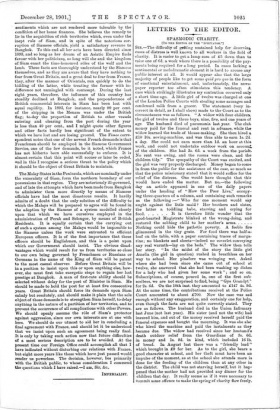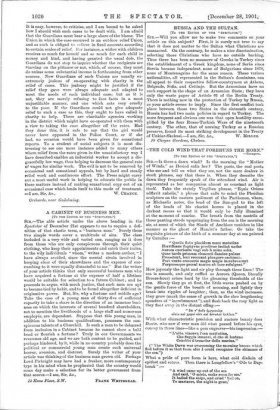LETTERS TO THE EDITOR.
• SPASMODIC CHARITY.
[To THE EDITOR 01 THE u spEoravoa.") Su,—The difficulty of getting sustained help for deservinh cases of distress is well known to all workers in the field of charity. It is easier to get a lump sum of 25 down than to raise one of 6d. a week where there is a possibility of the pay- ments being required for a long period. In cases lacking a sentimental or melodramatic element it is hard to arouse any public interest at all. It would appear also that the large majority of people like to get some quid pro quo in the form of emotional entertainment, and, unfortunately, the news- paper reporter too often stimulates this tendency. A. case which strikingly illustrates my contention occurred only, a short time ago. A little girl of twelve was charged at one of the London Police Courts with stealing some sausages and condensed milk from a grocer. The statement (very in- correct in detail, as I shall show) made to the Court as to the circumstances was as follows. "A widow with four children, the girl of twelve and three boys, nine, five, and one years of age. The husband died of pneumonia last year. The club money paid for the funeral and rent in advance, while the widow learned the trade of blouse-making. She then hired a, 210 10s. sewing-machine, and was thus able to earn is. 2d. a day. She could not earn more than id. an hour at this work, and could not undertake outdoor work on account of the children. She had 3s. 6d. a week from the parisin No rent was owing, and the rooms were clean, and the children tidy." The sympathy of the Court was excited, and the girl was very properly discharged. Money began to come in from the public for the assistance of the case, so much so that the police missionary stated that it would suffice for the relief of the distress. One would have thought that this would have ended the matter. But no,—the following day an article appeared in one of the daily papers under the heading of "How the Poor Live," occupy. lug' three-quarters of a column, and containing such remarks as the following :—" Who for one moment would say aught against the little maid ? Her brothers and sister, the latter a toddling babe, starving and crying for
food , It is therefore little wonder that the good-hearted Magistrate blinked at the wrong-doing, and
restored the sobbing child to her mother's arms Nothing could hide the pathetic poverty. A feeble fire glimmered in the tiny grate. ' For food there was half-a- loaf on the table, with a paper containing traces of marga- rine ; no blankets and sheets—indeed no coverlet conveying any real warmth—lay on the beds." The widow 'then tells her story. "In the midst of the story the little girl Amelia (the girl in question) rushed in breathless on her way to school. Her pinafore was wringing wet. Asked where she had been since she came out of school at twelve, she answered that she had been washing up dishes for a lady who had given her some work "; and so on. Subscriptions, of course, poured in, one of the first sub, scribers, we are not surprised to find, being " Gys Grandyt ' for 2s. 6d. On the 10th inst. they amounted to 2147 4s. 9d. At the same time, the contributions received at the Police Court amounted to about 2700. Now the case was sad enough without any exaggeration, and certainly one for help, even though the facts are not quite correctly stated. They are as follows. The husband died in the Union Infirmary last June (not last year). His sister (and not the wife) had insured him, and out of the money received herself paid the funeral expenses and bought the mourning. It was she alsc who hired the machine and paid the instalments as they .became due. The widow had received since her husband's death outdoor relief from the Guardians of 3s. Ea, in money and is. 9d. in kind, which included 16 lb. of bread. In August last there was a "friendly lead" which brought in 29 for her. As to the girl, she bears a good character at school, and her theft must; have been an impulse of the moment, as at the school she attends more is done for the feeding of the children than at any other in the district. The child was not starving herself, but it hap- pened that the mother had-not provided any dinner for the children that day. It really seems 'as if it were necessary to commit some' offence to make the spring of charity flow freely. It is easy, however, to criticise, and I am bound to be asked how I should wish such cases to be dealt with. I am afraid that the Guardians must bear a large share of the blame. The Union in which the case occurred is an outdoor relief Union, and as such is obliged to relieve in fixed amounts according to certain scales of relief. For instance, a widow with children receives so much for herself and so much for each child in money and kind, and having granted the usual dole, the Guardians do not stop to inquire whether the recipients are starving on the pittance or not, which, of course, they must do unless some substantial income is forthcoming from other sources. Now Guardians of such Unions are usually en. extremely jealous of co-operating with charity in the relief of cases. This jealousy might be justified if the relief• they gave were always adequate and adapted to meet the needs of each individual case; but as it is not, they are merely refusing to face facts in a most unjustifiable manner, and one which acts very cruelly to the poor. If the Guardians could not give adequate relief to such a case as this, they ought to have called in charity to help. There are charitable agencies working in the district which might have co-operated with them with a view to taking the case altogether off, the rates. Had they done this, it is safe to say that the girl would never have appeared in the Police Court, or if she had, no occasion would have been given for sensational reports. To a student of social subjects it is most dis- tressing to see one more instance added to many others where relief from the rates given in the unsatisfactory way I have described enables an industrial worker to accept a dis- gracefully low wage, thus helping to decrease the general rate of wages for similar work. The evil is not to be removed by occasional and sensational appeals, but by hard and steady relief work and continuous effort. The Press might carry out a most useful work in helping to educate the public in these matters instead of making sensational copy out of an occasional case which lends itself to this mode of treatment.
Orchards, near Godalming.



































 Previous page
Previous page